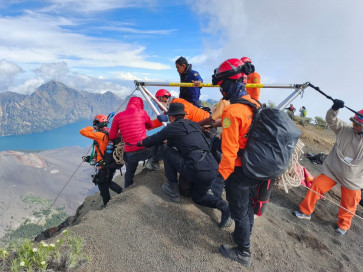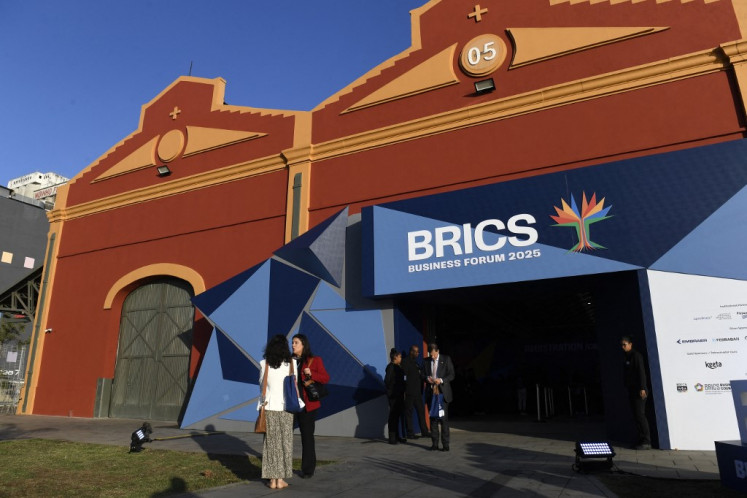Popular Reads
Top Results
Can't find what you're looking for?
View all search resultsPopular Reads
Top Results
Can't find what you're looking for?
View all search resultsNugraha Santosa: Diverse business environment demands situational leadership
(Courtesy of Nugraha Santosa)Nugraha Santosa believes in the power of innovative collaboration in IT world
Change text size
Gift Premium Articles
to Anyone
(Courtesy of Nugraha Santosa)
Nugraha Santosa believes in the power of innovative collaboration in IT world.
The IT firm executive said that different situations call for different leadership styles.
'Democratic leadership works best when a team has experienced members who are equals in terms of skill level'this way they can contribute more ideas and input,' said Germany-based IT firmWincor Nixdorf Indonesia president director Nugraha Santosa.
'However, when a situation is critical, the leadership style must be authoritative. A decision is made after considering various alternatives,' said the 50-year-old, who has spent half of his life devoted to the IT industry.
There is no one type of leadership style that suits all situations.
'If team members are new and have low-skill levels, they need more instruction. Providing more direction will make them comfortable as they are not ready to give input,' he said, adding that 'one size does not fit all'.
He likened the role of a leader to that of a music conductor, saying 'he is the one who instructs what musical instruments are to be played and who will continue or stop playing. If all musicians in the orchestra are skillful and play their instrument well, together they will create harmonious sounds,' he said.
'Similarly, when a team in a business project works well together, the business will run well and can achieve the expected and even surpass the set target,' he pointed out.
His knowledge of managerial approaches was gained by working in several companies, both local and multinational ones.
Nugraha started his IT career as a salesman engineer at a local company prior to his career debut with Japan-based IT products and services provider Fujisu; the International Business Machines Corporation (IBM), an American multinational technology and consulting corporation, and Wincor Nixdorf, a German corporation that provides retail and retail banking hardware, software and services.
According to him, each company he worked at had their own unique working culture that enriched him, especially with respect to managerial skills, even though he was required to become highly adaptive.
No matter the challenges he faced, however, Nugraha was able to manage.
As collaboration is a big part of Japanese corporate culture, he was required to adjust to that aspect when he joined a Japanese company. 'I had to discuss everything. But I could not follow 100 percent and one day, I should make a decision. So I fused it with local culture.'
Objectivity stands out in American corporate culture but 'you have your own ways and usually it is a short-term objective and therefore, I had to adapt to it,' he recalled another previous working experience.
According to him, European firms fit somewhere in the middle of American and Japanese corporate culture.
'When it comes to a project plan, most Japanese firms set three to five years; US companies between six to 12 months and European companies between one to three years,' he said.
'If there is a new initiative, a German firm will wait to see [market reaction to the new initiative], which encourages us to try new things,' he noted.
People are key
Having years of experience in IT-related products and services, he has discovered many valuable points that can push growth in IT firms, including the importance of people-based collaboration.
'In an IT world, collaboration is very important because delivery is through people. An IT solution is easy but people are challenging because it's hard to change the way people think. So, the key to success in an IT project lies in people,' he said.
Even though both IT and leadership skills are aspects that an IT company should adequately pay attention to, at the end of the day, people skills are crucial because 'in people, we can find a gap, a culture, a conflict, a shock, different views, expectations, etc. So, the challenge is how we manage them.'
According to him, the interesting part of becoming the no. 1 person in a company is seeing the company overall, not only business aspects but also delivery, people, legal compliance and finance.
'I can deliver through a team but, as a leader, I should know many things, from macro strategy to detailed micro management, which is very useful, especially when I have to attend a meeting or a conference overseas in which I am supposed to explain a project.'
On top of that, each division has its own key performance indicators (KPI).
'I have to balance them to avert conflict, say, between marketing and accounting because of their respective objectives. For instance, marketing will make an all-out-effort to service customers and accounting controls spending and so, I have to be just.'
'Now, one of the challenges companies are faced with is finding people with good character due to increasingly competitive human resources. It has become a challenge to retain people with good character in the IT world,' he said.
Keeping a team highly motivated is very crucial and Nugraha has found an effective way to do so.
He communicates the strategies of a project to his team clearly and rewards employees who perform well.
' I always declare that I am part of the team, I get involved. We are like a family. When we are tired after accomplishing a project, we watch a film together,' he said, adding that they also play futsal or badminton once a week.
Although he is now in his 50s, Nugraha still has a dream. He wants more of his software teams to work overseas, at least at the regional level. 'I am glad that several regional companies from the Philippines and Malaysia trust our software teams,' he said in a spirited tone.
The father of two has his own way of looking at relationships, especially when it comes to ex-employees. 'Even though several of my employees have left us to work at other companies, I maintain a good relationship with them.'
'Sometimes they even join our futsal or badminton matches. Some of our former employees have gone on to become entrepreneurs or our business partners. They are good ambassadors for us.'
Nugraha Santosa
Place/Date of Birth
Magelang, Central Java, Dec.6, 1963
Experience
Has 25 years experience in the IT industry. Currently is president director of PT Wincor-Nixdorf Indonesia. Previously, he held managerial positions in different companies, including country manager of marketing at IBM Indonesia for four years, director of PT Askom/Fujitsu for 12 years and business manager of PT Metrodata for three years. He embarked on his IT-related job career in 1987 as sales manager of PT Skill for two years.
Education
Electronic Engineering at Satya Wacana Christian University in Salatiga, Central Java, graduated in 1987.
At Ease
Sports can release stress and build a fighting spirit
Since I was a child, I've played different sports, namely, basketball, ping pong and tennis. But I like badminton and basketball the most because they move fast. Besides releasing stress, playing sports and business both aim to achieve something and build one's sense of sportsmanship. But the important thing is that they can build one's fighting spirit. That's why I also encourage my teams to play a sport.
Reading detective stories
I like reading different kinds of books, including management, strategy, leadership and detective. Reading a detective story is like a puzzle, arousing my curiosity. I read a lot on planes. But when I relax, I also like to read light books such as The Adventures of Rin Tin Tin.
The most compassionate and inspiring movie
I like watching movies, especially action in my spare time. I also accompany my wife to watch dramas. The most compassionate but inspiring movie is Invictus (a film that tells the story of how Nelson Mandela joined forces with South Africa's ruby team). 'It is about transformational leadership. I like it very much.'










